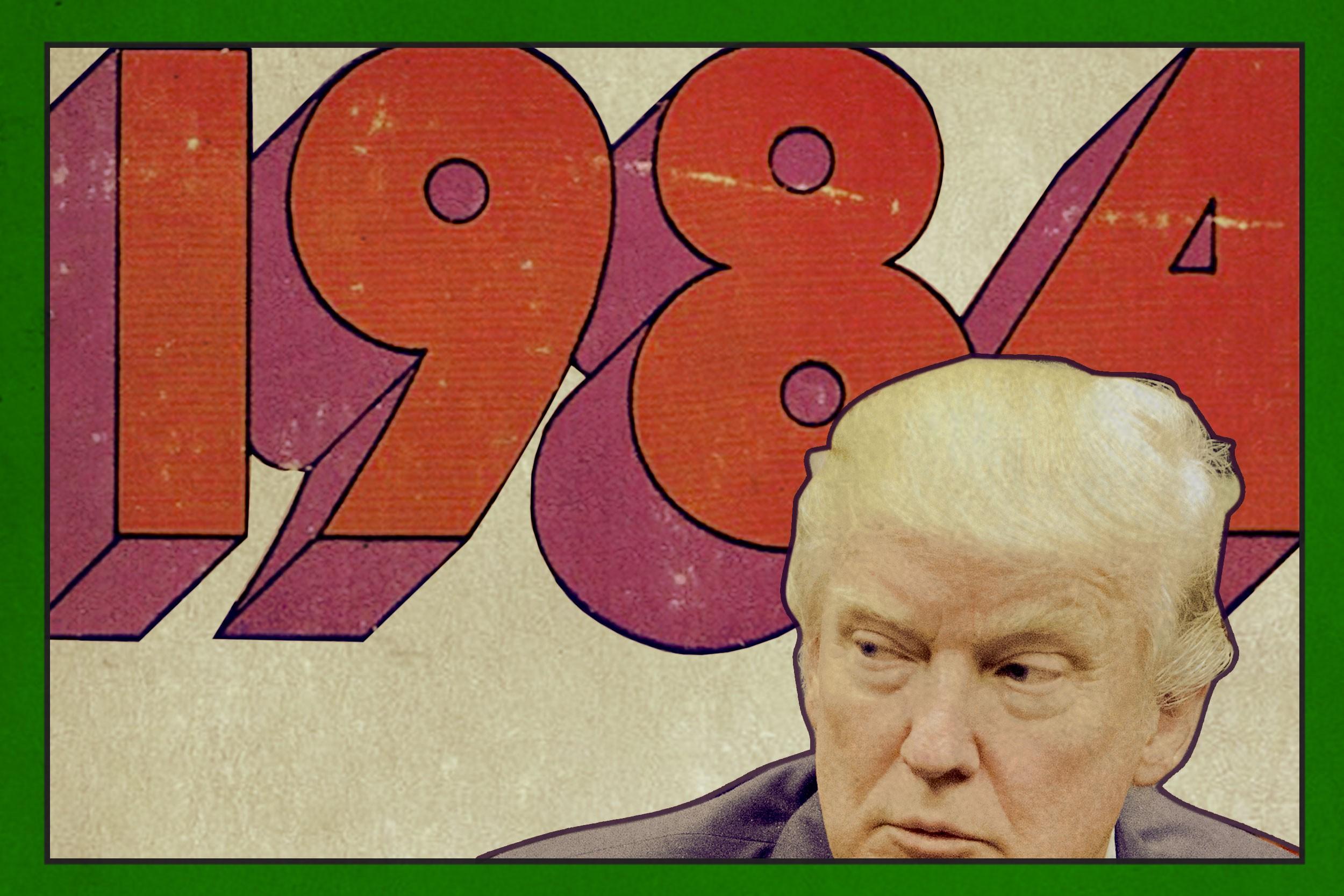‘1984’ in 2017
Exploring why George Orwell’s classic is Amazon’s no. 1 best seller
Reread any good books lately? A musty, old classic you might’ve frantically skimmed on the bus in high school, mere hours before you had a five-page essay due? A dystopian dirge far more depressing and nihilistic than the Nine Inch Nails tape glued into your Walkman at the time? Yes, George Orwell’s 1984, his vivid and colossally cynical 1949 novel about a bleak, totalitarian future, rocketed to no. 1 on Amazon’s best-seller list this week.
This is presumably because the political climate in this country is terrible, and much of the country is terrified. A little advice, for which I am not being financially compensated: Read it on a Kindle if you can. Not so much because you can highlight/underline passages with your finger, but because, in a slightly dystopian twist, it’ll point out passages that a lot of other people have already underlined, so you can just agree with those. At press time, 2,465 readers have flagged this sentence: “The best books, he perceived, are those that tell you what you know already.”
Let’s immediately note that the Amazon Best Sellers page, which updates hourly and confounds daily, is an odd and incongruous little chart. As of Thursday morning, separate editions of 1984 held the no. 1 and no. 5 positions. At no. 2, Tools of Titans: The Tactics, Routines, and Habits of Billionaires, Icons, and World-Class Performers, by Timothy Ferriss (foreword by Arnold Schwarzenegger). At no. 3, J.D. Vance’s well-reviewed sociological treatise Hillbilly Elegy, described by The New York Times as “a tough love analysis of the poor who back Trump.” At no. 10, The Whole30: The 30-Day Guide to Total Health and Food Freedom. At no. 11, the children’s book First 100 Words, which, once again without any financial compensation, I heartily endorse.
At no. 15, Trump: The Art of the Deal.
Two other dim jewels in the worst-case-scenario canon sneak in there, too: Sinclair Lewis’s 1935 fascism-hits-America jam It Can’t Happen Here, and Aldous Huxley’s 1932 sci-fi staple Brave New World, another Summer Reading List all-timer intertwined with 1984 in the public imagination. Orwell insisted our oppressors would crush us via total surveillance and sadistic violence; Huxley thought they’d dope us up with drugs while distracting us with mindless sex and other frivolities. Huxley wrote Orwell a sassy, undermine-y letter after 1984 was published to insist he was right. They’d have definitely done a whole podcast series about this, had that technology existed at the time.
Orwell, apparently, won the war over guessing how we’d lose the war. His deadliest weapon: catchier jargon. If you recall anything about 1984, it’s the evocation of Big Brother as the ultimate dictator/big bad, and the menacing new language he ushered in: thoughtcrime, doublethink, unperson, ownlife (now a bad thing), doubleplusungood (also a bad thing).
According to the liberal media, the specific event that triggered the novel’s resurgence is Trump cohort Kellyanne Conway’s appearance this past Sunday on Meet the Press. As you are unfortunately aware, the Trump administration has insisted, despite all evidence to the contrary, that his inauguration was the most popular and well-attended inauguration in history. Pressed to defend this obvious falsehood, advanced by White House press secretary Sean Spicer in a contentious press conference the day before, Conway insisted that Spicer simply “gave alternative facts.” Not quite as catchy as 1984, but close enough.
What’s frightening to people here is: Why would Trump and his various mouthpieces continue to make false claims about something (a) so pointless and (b) so easily and empirically disprovable? “The Party told you to reject the evidence of your eyes and ears,” Orwell writes. “It was their final, most essential command.” A central conceit of the novel is that it’s possible to teach someone that two plus two really does equal five. Is there a Radiohead song on this topic (presumably)? You bet.
So why are all these people buying 1984, then? Do they want advice? Confirmation that they’re not just imagining things? (“It was not by making yourself heard but by staying sane that you carried on the human heritage” — 6,043 underliners.) A preview of coming attractions? In the event you no longer recall padding your five-page high school essay with a lengthy plot summary, the book follows Winston Smith, doomed everyman, living in what used to be London in what he assumes to be the year 1984. (Facts don’t really exist anymore, so nobody knows for sure.) London is now part of Oceania, one of three major world powers, which is always at war with exactly one of the others, Eastasia and Eurasia. The wars switch up every few years to keep the masses off-balance. Big Brother is always watching, and everything sucks.
Not to be crude, which the book both isn’t and very much is. Winston works for the Ministry of Truth (which manufactures lies, in his case by rewriting old newspaper articles to obliterate any facts inconvenient to Big Brother in retrospect) and is destined to end up in the Ministry of Love (where he will be imprisoned and tortured). It’s irony, see. Orwell lays it on pretty thick; if you want a picture of the future, imagine a dude with a monocle, rolling his eyes — forever. His big, menacing technological invention is the telescreen, a TV that you can’t turn off, constantly both spewing and collecting information — there’s at least one in every room, blasting constant propaganda and also openly spying on you via video camera. What Orwell failed to predict is that one day we’d carry those around in our pockets and fill them with compromising personal information willingly. Is there an Arcade Fire song on this topic? You bet.
Winston falls in love with Julia, a much younger and bolder girl, and for a while they have a super-clandestine romance. Sex, Orwell explains at some length, is violently stigmatized and mostly forbidden in this society, given that “sexual privation induced hysteria, which was desirable because it could be transformed into war-fever and leader-worship.” (I sure as hell highlighted that, at least.) Family is no sanctuary, either: Your children are encouraged to spy on and ultimately betray you.
The resulting tensions are all funneled into activities like the daily Two Minutes Hate, wherein huge congregations scream at a telescreen displaying the face of a possibly imaginary and globally despised underground resistance leader. This passage has 3,316 underliners:
So it’s like watching Meet the Press, basically. Immediately before their arrest, Winston and Julia read at length from the fairly turgid underground resistance movement’s manifesto, which covers such topics as Why Permanent War Is Necessary (to keep everyone poor and distracted), and Why True Equality Is Impossible. (“In the long run, a hierarchical society was only possible on a basis of poverty and ignorance” — 3,397 underliners.) Here and elsewhere, Orwell also works out his complicated, snooty feelings about “the proles,” who make up 85 percent of the population and could forcefully overturn this corrupt society anytime they wished. But no, instead, they remain content with their humdrum, ignorant, subjugated lives, most of them morbidly obese and obsessed with both the Lottery and various worthless, artless popular songs machine-composed by the Party on a “versificator.” The word drivel comes up a lot. Orwell was likely not too awesome at parties. This sort of thing is ripe for gleeful parody; Weird Twitter is on it.
And then Winston and Julia are arrested and tortured, and the hell with it. Probably stop reading at this point, if you’re in it for the moral support.
Opinions will vary wildly on how much overlap we’re dealing with here, obviously. One specific disquieting parallel might be Trump’s perceived treatment of the EPA, from the shutdown of communications to the temporary freezes of contracts and grants (reportedly standard procedures for an incoming administration) to the fear that all climate-change evidence might vanish to the phenomenon of rogue social media editors for national parks showing more backbone than most Democratic senators. If there’s a Billboard Heatseekers–type chart for up-and-coming highlighted 1984 passages, this one’s probably on the rise: “In Oceania at the present day, Science, in the old sense, has almost ceased to exist. In Newspeak there is no word for ‘Science.’”
After this week — with a clampdown on immigration, support of torture, and an executive order for a border wall — comparisons like these sound both plainly hysterical and disturbingly plausible. Many are searching for the appropriate hysteria level. So here’s one quick and dirty way to attempt to summarize what accounts for the burgeoning Orwellaissance:
These are extraordinary and divisive times; it is natural that we would gravitate toward history’s most extraordinary and divisive fiction. To revisit 1984 as a guide to modern living is a wild overcompensation. As a list of action items, it’s frankly pretty worthless. But the degree of overlap is debatable, so we might as well debate it while we can.
And if we’re using the Amazon Best Sellers page as a reflection of the national mood, consider overcompensating in the opposite direction with, at press time, entry no. 7: Mark Manson’s cheerfully profane self-help book, The Subtle Art of Not Giving a F*ck: A Counterintuitive Approach to Living a Good Life. “Fuck positivity,” he writes. “Let’s be honest; sometimes things are fucked up and we have to live with it.” That line’s probably been underlined several thousand times, too.

